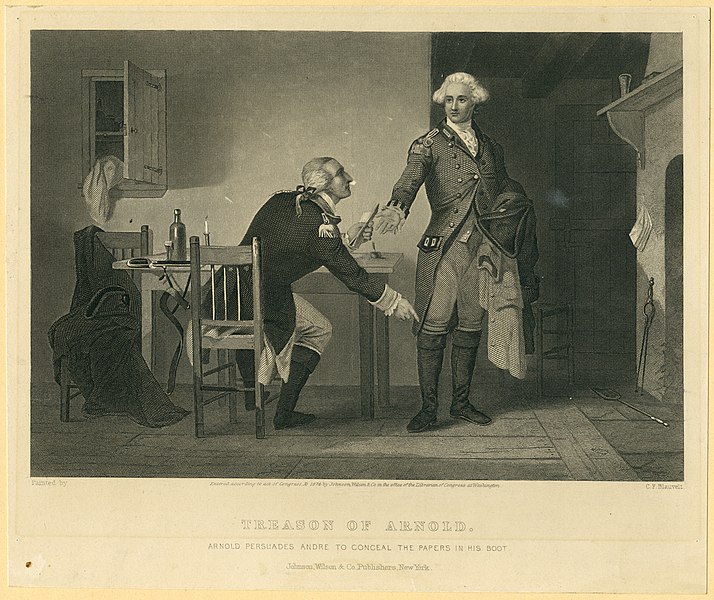Benedict Arnold (1741-1801) was an American military officer during the American Revolutionary War.
He initially fought for the American cause, demonstrating bravery and leadership in capturing Fort Ticonderoga and playing a crucial role in the American victory at the Battle of Saratoga.
However, financial troubles, personal grievances, and influences from loyalist connections led him to betray the Continental Army. In 1780, he conspired with the British to surrender West Point, a critical American fort.
The plot was discovered, and Arnold escaped capture, joining the British forces as a brigadier general for the remainder of the war.
After the war, he settled in Canada and died in obscurity in 1801. Benedict Arnold’s name is now synonymous with treachery and betrayal in American history.
| Date | Event |
|---|---|
| January 14, 1741 | Benedict Arnold is born in Norwich, Connecticut, in the American colonies. |
| 1775 | Joins the Connecticut militia and participates in the capture of Fort Ticonderoga. |
| September 25, 1775 | Leads an expedition through the Maine wilderness to capture Quebec City. |
| 1776 | Promoted to the rank of brigadier general and participates in the American invasion of Canada. |
| 1777 | Plays a crucial role in the American victory at the Battle of Saratoga. |
| 1778 | Marries Peggy Shippen and begins secretly corresponding with British officials. |
| 1780 | Betrays the Continental Army by agreeing to surrender West Point to the British. |
| September 25, 1780 | Plot to surrender West Point is discovered. |
| 1783 | Serves as a British brigadier general for the remainder of the war. |
| 1791 | Moves to Saint John, New Brunswick, Canada. |
| June 14, 1801 | Benedict Arnold dies in Saint John, New Brunswick. |
Timeline of Benedict Arnold
January 14, 1741: Benedict Arnold is born in Norwich, Connecticut, in the American colonies
Benedict Arnold was born into a well-established and respected family in Norwich, Connecticut. He grew up in a relatively comfortable environment, but his family’s finances suffered setbacks over the years, which played a role in his later decisions.

1775: Joins the Connecticut militia and participates in the capture of Fort Ticonderoga
With the outbreak of the American Revolutionary War in 1775, Benedict Arnold quickly aligned himself with the revolutionary cause. He joined the Connecticut militia and demonstrated his military leadership by participating in the capture of Fort Ticonderoga in New York.
This was a significant early victory for the American rebels, as it provided them with valuable artillery and munitions.
September 25, 1775: Leads an expedition through the Maine wilderness to capture Quebec City
Benedict Arnold’s leadership qualities were further showcased when he led a daring expedition through the rugged and largely uncharted wilderness of Maine with the goal of capturing the city of Quebec in Canada, a British stronghold.
The expedition was grueling and faced numerous challenges, including harsh weather, difficult terrain, and dwindling supplies.
Despite these difficulties, Arnold and his men managed to reach Quebec, but their attempt to capture the city was unsuccessful. Arnold was wounded in the leg during the Battle of Quebec, which marked the end of the expedition.

1776: Promoted to the rank of brigadier general and participates in the American invasion of Canada
In recognition of his efforts and leadership during the failed Quebec expedition, Benedict Arnold was promoted to the rank of brigadier general in 1776. He continued to play a significant role in the early stages of the American Revolutionary War.
Arnold was given the responsibility of leading American forces in the invasion of Canada once again, this time as part of a coordinated effort to gain control of British-held territory.
The invasion, however, did not achieve its objectives, and Arnold’s health suffered due to the harsh conditions and constant campaigning.
1777: Plays a crucial role in the American victory at the Battle of Saratoga
Benedict Arnold is perhaps best known for his heroic actions at the Battle of Saratoga in 1777. During this battle, he served under General Horatio Gates and demonstrated exceptional leadership and bravery.
Arnold’s tactical brilliance and personal valor were instrumental in turning the tide of the battle in favor of the American forces. His actions contributed significantly to the surrender of British General John Burgoyne and his army, which is considered one of the turning points of the American Revolutionary War.
Despite his contributions, Arnold’s relationship with his superiors became strained, and he felt underappreciated.
1778: Marries Peggy Shippen and begins secretly corresponding with British officials
In 1778, Benedict Arnold married Peggy Shippen, a woman from a loyalist family. This marriage connected him to individuals sympathetic to the British cause.
Arnold’s financial situation also worsened, and he found himself deeply in debt. It was during this time that he began secret correspondence with British officials, including British Major John André.
These communications set the stage for Arnold’s eventual betrayal of the Continental Army and his decision to conspire with the British to surrender West Point, a critical American fort, in exchange for money and a commission as a brigadier general in the British Army.
1780: Betrays the Continental Army by agreeing to surrender West Point to the British.
Benedict Arnold’s betrayal of the Continental Army is one of the most infamous episodes in American history.
In 1780, while serving as the commander of West Point, a strategically important American fort on the Hudson River, Arnold entered into negotiations with the British to surrender the fort to them.
His primary motive was financial gain and resentment toward his treatment by some American leaders.
September 25, 1780: Plot to surrender West Point is discovered
The plot to surrender West Point was exposed when British Major John André, who was carrying documents related to the conspiracy, was captured by American forces. André was found with incriminating evidence that revealed Arnold’s treachery.
As a result, Arnold narrowly escaped capture by fleeing to the British lines. André, on the other hand, was eventually executed as a spy.
1783: Serves as a British brigadier general for the remainder of the war
After his defection to the British side, Benedict Arnold was granted a commission as a brigadier general in the British Army. He served the British cause for the remainder of the Revolutionary War, participating in various military actions.
Despite his efforts, the British were ultimately defeated, and the war came to an end in 1783 with the Treaty of Paris.
1791: Moves to Saint John, New Brunswick, Canada
Following the American victory and the end of the war, Benedict Arnold and his family left the United States and settled in Saint John, New Brunswick, Canada. In Canada, he engaged in various business ventures, including a shipping company.
Arnold’s reputation continued to be a topic of controversy, as some Canadians saw him as a war hero while others viewed him with suspicion due to his past.
June 14, 1801: Benedict Arnold dies in Saint John, New Brunswick
Benedict Arnold spent the remaining years of his life in relative obscurity in Saint John. He died on June 14, 1801, at the age of 60. He was buried in the Loyalist Burial Ground in Saint John. Despite his earlier heroic actions during the Revolutionary War, Arnold’s name has become synonymous with treachery and betrayal in American history.
